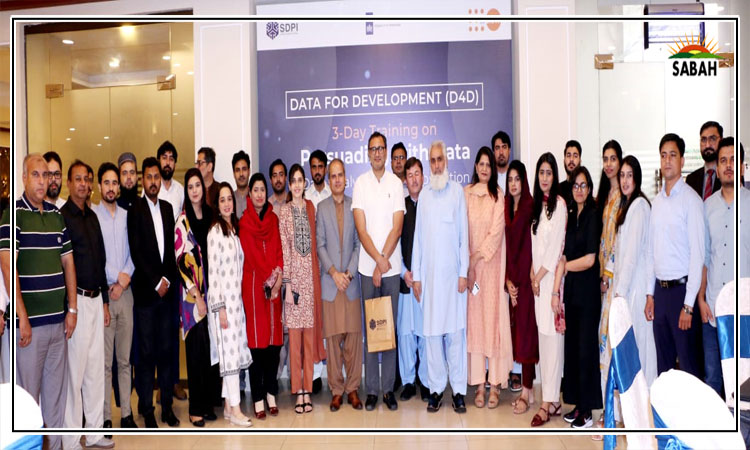D4D right step for redressing data ecosystem constraints to improve policy direction: Dr Naeem Zafar says during joint initiative of UNFPA & SDPI
LAHORE, Sep 28 (SABAH): The United Nations Population Fund (UNFPA) and the Sustainable Development Policy Institute (SDPI) under its joint the “Data for Development (D4D)” initiative imparted training to midcareer professionals of national level statistical and public sector departments for evidence-based development planning at the provincial level.
The United Nations Population Fund (UNFPA) and the Sustainable Development Policy Institute (SDPI) have partnered to launch the “Data for Development (D4D)” initiative, aiming to enhance the capacity of Pakistan’s National Statistical System (NSS) and Public Sector for needs assessments of bureaus of statistics, interactive workshops, data and knowledge production, dissemination, and partnerships.
Addressing as chief guest at the concluding ceremony, Dr Naeem Uz Zafar, PBS, Chief Statistician Pakistan Bureau of Statistics (PBS) in his keynote address congratulated the SDPI and UNFPA for strongly supporting the cause of improving data ecosystem.
He said there is an urgent need to address and correct our data constraints to improve the policy direction, whereas the SDPI and UNFPA have rightly chosen provincial Bureaus of Statistics and planning departments to acquaint them with modern data trends and techniques.
Dr Zafar on behalf of PBS also appreciated the D4D effort to fill the gaps to improve data ecosystem in the country. “We have huge data gaps on the real side because data insights are not available when the decision-making process is being done,” he said.
“There have been no comparison on the models being made in the previous decades like population, agriculture and others,” he said, adding that the country needed to reckon the failures of various projects for better development planning.
“Population is the denominator of every indicator of economic and calculations that needs to be address on urgent basis and data to validate its decisions in the right direction is the next important step,” he said.
Dr Naeem Uz Zafar underlined that it is critical to develop visuals out of data to grab more attention of relevant stakeholders with focus on developing data into visual through maps, infographics, images, diagrams, pie charts, color coding and etc.
The main components of D4D are strengthening the NSS, with a primary focus on provinces, to collect, analyze, and disseminate data, developing the capacity of academia to undertake actionable research addressing real-world challenges, promoting dialogue to foster a culture of data-driven development planning and fostering collaboration among government institutions, development partners, think tanks, civil society, and academia.
The 3-day training on “Persuading with Data” focused on to capacitate mid-career officers within the national statistical system to interpret and use data to improve its applicability and relevance to policy making.
Dr Sajid Amin Javed, Deputy Executive Director, Lead for Data for Development (D4D) at the commencement of the session apprised the participants on the era of data with its overarching and crosscutting nature affecting policy and decision-making efforts. He said, “Humans world over produce 2500 quadrillion data bytes per day based on usage of social media, internet websites and others making them the largest data producers in the world.”
Dr Sajid underscored that evidence was based on three components of data or numbers, context, and interpretation as in isolation any of these could not be attributed as evidence due to their intermingling effects on other contours of data-based decision and policy making.
Dr Rafi Amiruddin, Head of department and associate professor in the Department of Economics, COMSATS Lahore emphasised upon role of data in public policy and underlined the significance of correct inference from data and moral imperatives of data collection that meticulously discussed different facets of data, its implications and role in decision making.
The training has been joined by eight departments including Bureaus of Statistics, Population Research Centers, Commissionerate of Afghan Refugees, Planning and Development Department, Punjab Commission for the Status of Women, Pakistan Public Works Department and Sustainable Development Policy Institute.
At the concluding session, Dr Sajid Amin provided a round up of the three-day training that focused on imparting process to interact with data and on different techniques due to diverse groups like regression analysis, data collection, selection biases, good data design and others.
Muhammad Nasir Khan, Deputy Director, Sindh Bureau of Statistics, Planning and Development Department said the data milieu is rapidly evolving with every passing day that demands an extraordinary effort for statisticians to keep their inventories and procedures abreast with new trends.
“Four million tera bytes data is being generated per day and there is unstructured data coming to the system. However, with the rise in volume of data there will be new tools developed for managing it that need to be explored for proactive system,” he said.
Balochistan Bureau of Statistics’ Amir said the Bureau of Statistics is the backbone of planning and development department whereas in Balcohistan the policies are mostly based on political biases sans data availability. He suggested to hold a department trainings on the knowledge imparted under the D4D Initiative to apprise the other team members of the relevant bureaus.
Khaliq-ur-Rehman, Director (Bureau of Statistics), Khyber Pakhtunkhwa said there should be a single PBS across the country whereas the provincial departments should feed in data to have a standardized system with one vision. He claimed that he had studied all other provincial bureaus of statistics but there is none to be attributed as a role model.
Dr Rubina Ali, UNFPA Assistant Representative Pakistan in her closing remarks commended the training instructors and participants for their keen interest and becoming part of the strategic endeavour. She said the data collection and management is a very expensive task as it has been claimed that the government at certain levels is taking loans to maintain it.
There should be focus on accuracy, capacity enhancement and utilisation of data as the data if failed to explain story and is also not accurate, complete and to the point then it’s a wastage of time, she said. She added that there was no national statistical plan of any less developed countries in the world being fully funded, whereas it was a precious effort taking place under the D4D Initiative.
Meanwhile, the United Nations Population Fund (UNFPA) and the Sustainable Development Policy Institute (SDPI) under the “Data for Development (D4D)” initiative, held a stakeholder consultation on the Data Governance Framework(DGF)being developed, with provincial bureaus of statistics with the aim to strengthen Pakistan’s National Statistical System (NSS) and Public Sector for evidence-based development planning, especially at the provincial level.
The consultation was organized to further refine the DGF in alignment with provincial needs which was participated by representative of Pakistan Bureau of Statistics, Director General, Punjab Bureau of Statistics, Director, Sindh Bureau of Statistics, Director, Khyber Pakhtunkhwa Bureau of Statistics and Director, Balochistan Bureau of Statistics.












